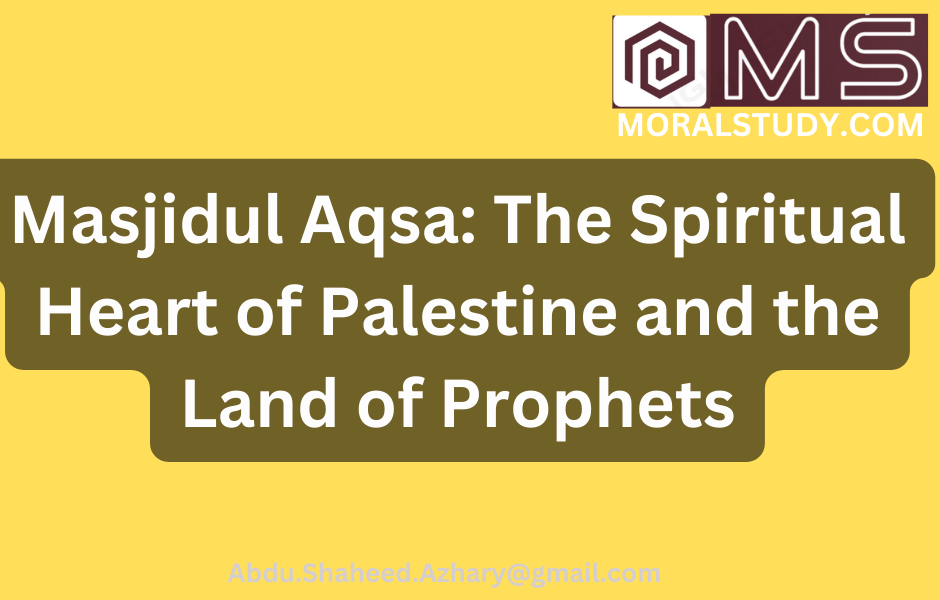Palestine, often associated with political conflict, carries a
deeper spiritual significance for Muslims, transcending its contemporary
challenges. When we utter the word “Palestine,” we should not merely
envision a political entity or conflict; instead, we should conjure the image
of Masjidul Aqsa, a blessed sanctuary mentioned in the Quran. Our connection
with Palestine is an intricate tapestry of emotions, spirituality, and
religion.
While Masjidul Aqsa is not officially designated as the ثالث الحرمين, the third Haram
(sacred place) after Mecca and Medina, it is undeniably a blessed land, as
explicitly mentioned in the Quran. As Ibn Qayyim aptly noted, Medina was
sanctified by Prophet Muhammad r, and Mecca by Prophet
Ibrahim u,
but Allah Himself blessed Masjidul Aqsa, bestowing it with unique significance.
Masjidul Aqsa holds the exceptional distinction of being a
dwelling place for numerous prophets. According to Hadith, numerous prophets
congregated in Masjidul Aqsa, with our Prophet Muhammad leading them during his
miraculous Isra journey. This privilege is not even afforded to Mecca.
Muslim reports:
وَقَدْ رَأَيْتُنِي فِي جَمَاعَةٍ مِنَ الأَنْبِيَاءِ فَإِذَا مُوسَى
قَائِمٌ يُصَلِّى….. فَحَانَتِ الصَّلاَةُ فَأَمَمْتُهُمْ .
I
also saw myself among the group of apostles. I saw Moses saying prayer and……….. When the time of
prayer came, I led them.
The Quran introduces the land of Masjidul Aqsa as “الأرض المقدسة,” which
translates to the Holy Land, underlining its sacredness. The story of Masjidul
Aqsa traces back to Prophet Ibrahim u, who embarked on a
journey from Ur, in Mesopotamia, to settle in Palestine. He gave birth to Ishaq
and Yakoob, with the Prophet Muhammad t being the descendant of
Ismael, the son of Ishaq, the son of Ibrahim. Most of the well-known prophets,
such as Yusuf u,
Musa t,
and Isa u,
are descendants of Yakoob u,
the son of Ishaq u,
the son of Ibrahim u.
Understanding the importance of Prophet Yakoob u is, therefore,
paramount.
Israel, in essence, represents another name for Prophet Yakoob u.
According to biblical accounts, he earned this name after wrestling with the
Lord and emerging victorious. However, this narrative contradicts Islamic
beliefs, where Allah cannot be represented in any form, including that of a
human being. Struggling with Allah, who is omnipotent, is inconceivable in
Islamic theology.
The history of Banu Israel commences with the story of Yakoob’s
son, the young Yousuf, who was taken to Egypt due to his brothers’ plot to kill
him. In Egypt, Yousuf rose to become the head of finance for the government and
married Zulekha. He eventually brought all his brothers to Egypt, marking the
inception of the Banu Israel community. They prospered to the extent that they
formed a distinct community in Egypt, second in size only to the Coptic
religion.
However, their flourishing community faced degradation and
persecution under the rule of the Egyptian king, Pharaoh. This period ushered
in the era of Prophet Musa u.
Young Musa was raised in Pharaoh’s palace and later emerged as the leader of
Banu Israel. Moses rejected the divinity of Pharaoh, leading to his flight to
escape persecution. He miraculously crossed the Red Sea, with Pharaoh’s
pursuing army meeting a watery demise.
Musa u
continued his journey, following Allah’s command to enter the Holy Land.
However, the Jewish people, Banu Israel, hesitated due to the presence of a
formidable king. They urged Moses to enter with his Lord and fight, but their
disobedience invoked Allah’s punishment. They were sentenced to spend 40 years
in the Sinai Desert. Musa u,
fervently desiring to enter the Holy Land, was unable to realize this dream and
passed away, with his final hope being to be buried in the vicinity of Baitul
Muqaddas.
Part 2 to be continued. The article by Abdushaheed Azhary @moralstudy.com
